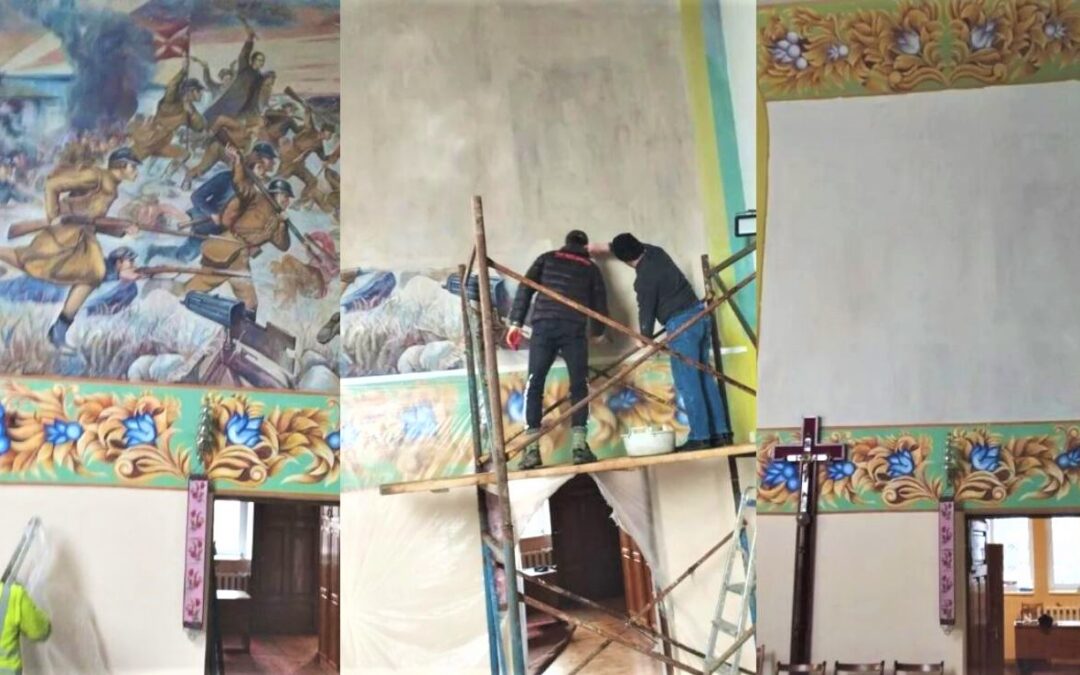Poland has condemned a decision by the Belarusian authorities to paint over a fresco commemorating the 1920 Battle of Warsaw – at which Polish forces defeated the Soviet Red Army – at a Polish church in western Belarus that before World War Two was part of Poland.
The decision to cover up the artwork in the village of Soly, near the city of Grodno, came after the Belarusian state broadcaster claimed it “depicts the murder of Soviet soldiers” and “inflames hostility on the basis of nationality”.
It follows a recent campaign by the Belarusian authorities targetting the country’s large ethnic Polish community. Poland’s foreign ministry has condemned the decision to paint over the fresco as further “destruction of Polish cultural heritage in Belarus by the Lukashenko regime”.
Potèpiamy niszczenie polskiego dziedzictwa kulturowego na Białorusi przez łukaszenkowski reżim. Dziedzictwo to stanowi integralną część historii Białorusi. Jego niszczenie jest niegodne i niezgodne z zasadami cywilizowanego świata. https://t.co/c1tEQjW4sI
— Łukasz Jasina (@RzecznikMSZ) February 28, 2023
“This heritage is an integral part of Belarus’ history,” tweeted the ministry’s spokesman, Łukasz Jasina. “Its destruction is undignified and incompatible with the principles of the civilised world.”
The fresco – which was painted during the interwar period, when Grodno was part of Poland – came to wider attention last year when Belarusian state broadcaster ONT aired a programme in which a reporter filmed undercover at the Catholic church in Soly, reports Belsat, a Polish-based Belarusian news service.
The artwork depicts a famous battle near Warsaw in 1920 – known in Polish as the “Miracle on the Vistula” – in which Poland prevented the Soviet Red Army from advancing towards western Europe.
This week marks the centenary of the Battle of Warsaw, at which Poland inflicted a decisive defeat on the Soviet Red Army and changed the course of European history.
Norman Davies explains the battle's causes, course and consequences https://t.co/NGUvgxOkKG
— Notes from Poland 🇵🇱 (@notesfrompoland) August 12, 2020
In a secretly recorded conversation with the parish priest, Leonard Stankowski, he was shown saying that the fresco was painted over during the communist era but then subsequently restored.
He also said that Belarusian district officials had come to the church ordering the fresco to be painted over again, but he had refused to do so
“I am against it because the [frescoes] are blessed, consecrated. A clergyman specially appointed by the archbishop came and blessed them, so they are sacred,” said Stankowski, quoted by Belsat.
Poland has "lodged a strong protest" to Belarus over the destruction of a cemetery for Polish wartime resistance fighters.
Warsaw says the "barbaric" incident is part of an “anti-Polish campaign by the Belarusian authorities”https://t.co/oLOLMNXskV
— Notes from Poland 🇵🇱 (@notesfrompoland) July 6, 2022
After broadcasting the undercover material, Belarusian state TV asked whether such a fresco, depicting the “murder of Soviet soldiers”, should be present in a “church of sovereign Belarus”. The station’s Telegram channel stated also that the painting “inflames hostility on the basis of nationality”.
“Poland is once again plagued by phantom pains and its authorities are seriously considering the incorporation of western Belarus,” said the reporter, referring to completely unsubstantiated claims in Belarusian propaganda that Poland is seeking to annex its former lands now in Belarus.
The church also houses a plaque honouring members of Poland’s underground army in World War Two, which resisted the German-Nazi occupation but was later persecuted by the postwar communist authorities. Belarusian state TV’s reporter claimed this was evidence of the church collaborating with “fascists”.
She announced that the materials collected by the journalists would be handed over to the prosecutor’s office. This week, pictures emerged of men painting over the fresco, reportedly at the behest of local authorities.
The development marks the latest stage in a long-running series of actions by the authorities in Belarus aimed against the country’s ethnic Polish community, which is around 300,000 strong according to official estimates but which Poland’s foreign ministry claims may number over a million.
Last month, a Belarusian court sentenced one of the community’s leading figures, journalist Andrzej Poczobut, to eight years in prison for “inciting hatred” and “the rehabilitation of Nazism”. Poland and various international organisations have condemned the decision.
Warsaw notes that such actions have come in the wake of its vocal support for the Belarusian political opposition following the protests that emerged after Alexander Lukashenko’s proclaimed presidential election victory in 2020.
A Belarusian court has sentenced Andrzej Poczobut – a leading figure in Belarus’s ethnic Polish community and an independent journalist – to eight years in prison.
Poland called the verdict "an inhumane decision by the Belarusian regime"https://t.co/CNIAgj0LUw
— Notes from Poland 🇵🇱 (@notesfrompoland) February 8, 2023
Main photo credit: Witek Korybut-Daszkiewicz / Facebook

Alicja Ptak is deputy editor-in-chief of Notes from Poland and a multimedia journalist. She has written for Clean Energy Wire and The Times, and she hosts her own podcast, The Warsaw Wire, on Poland’s economy and energy sector. She previously worked for Reuters.




















